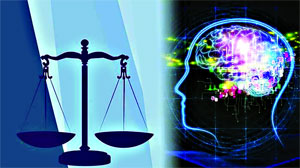ARTIFICIALLY INTELLIGENT attorney ROSS performs excellently. Lawyers ask questions in natural language and get relevant answers.The ROSS platform is built on IBM’s Watson cognitive computer. IBM’s technology managed companies and is now practicing law. ROSS is learning other areas of law to expand system into all firms.
ROSS, the world’s first artificially intelligent attorney powered by Watson, recently landed a position at New York law firm Baker & Hostetler handling the firm’s practice.
The machine is designed to understand language, provide answers to questions, formulate hypotheses and monitor developments in the legal system.
What can ROSS do?
Lawyers ask ROSS research questions in natural language, just like they were talking to a colleague, and the AI ‘reads’ through the law, gathers evidence, draws inferences and returns with a ‘highly relevant’, evidence-based answer.
The programme will continue to improve the more it is used.
It also keeps track of developments in the legal system and especially if anything pertains to a lawyer’s specific case.
‘At BakerHostetler, we believe that emerging technologies like cognitive computing and other forms of machine learning can help enhance the services we deliver to our clients,’ said Bob Craig, Chief Information Officer.
‘We are proud to team up with innovators like ROSS and we will continue to explore these cutting-edge technologies as they develop.’
Ross: A very smart artificial co-worker
Ross, the world’s first artificially intelligent attorney, has its first official law firm. Baker & Hostetler announced that they will be employing Ross for its bankruptcy practice, currently comprised of almost 50 lawyers.

Law firm Baker & Hostetler has announced that they are employing IBM’s AI Ross to handle their bankruptcy practice, which at the moment consists of nearly 50 lawyers. According to CEO and co-founder Andrew Arruda, other firms have also signed licenses with Ross, and they will also be making announcements shortly.
“In addition, ROSS monitors the law around the clock to notify you of new court decisions that can affect your case.”
IBM’s Watson
Ross, “the world’s first artificially intelligent attorney” built on IBM’s cognitive computer Watson, was designed to read and understand language, postulate hypotheses when asked questions, research, and then generate responses (along with references and citations) to back up its conclusions. Ross also learns from experience, gaining speed and knowledge the more you interact with it.
“You ask your questions in plain English, as you would a colleague, and ROSS then reads through the entire body of law and returns a cited answer and topical readings from legislation, case law and secondary sources to get you up-to-speed quickly,” the website says.
Ross also minimizes the time it takes by narrowing down results from a thousand to only the most highly relevant answers, and presents the answers in a more casual, understandable language. It also keeps up-to-date with developments in the legal system, specifically those that may affect your cases.
The legal industry enhanced
Baker & Hostetler chief information officer Bob Craig explains the rationale behind this latest hire: “At BakerHostetler, we believe that emerging technologies like cognitive computing and other forms of machine learning can help enhance the services we deliver to our clients.”
“BakerHostetler has been using ROSS since the first days of its deployment, and we are proud to partner with a true leader in the industry as we continue to develop additional AI legal assistants,” he added.
The ROSS platform is built on IBM’s Watson cognitive computer, which supports it with the same cognitive computing and natural language processing capabilities that won Jeopardy in 2011. Lawyers ask ROSS research questions in natural language and the AI returns with a ‘highly relevant’, evidence-based answer
In addition, ROSS monitors the law around the clock to notify you of new court decisions that can affect your case.’
Lawyers ask ROSS research questions in natural language, just like they were talking to a human colleague, and the AI ‘reads’ through the law, gathers evidence, draws inferences and returns with a ‘highly relevant’, evidence-based answer.
And the programme will continue to improve the more it is used.
It will also keep track of developments in the legal system, specifically information that pertains to a lawyer’s specific case.
Source: Weekly Holiday










